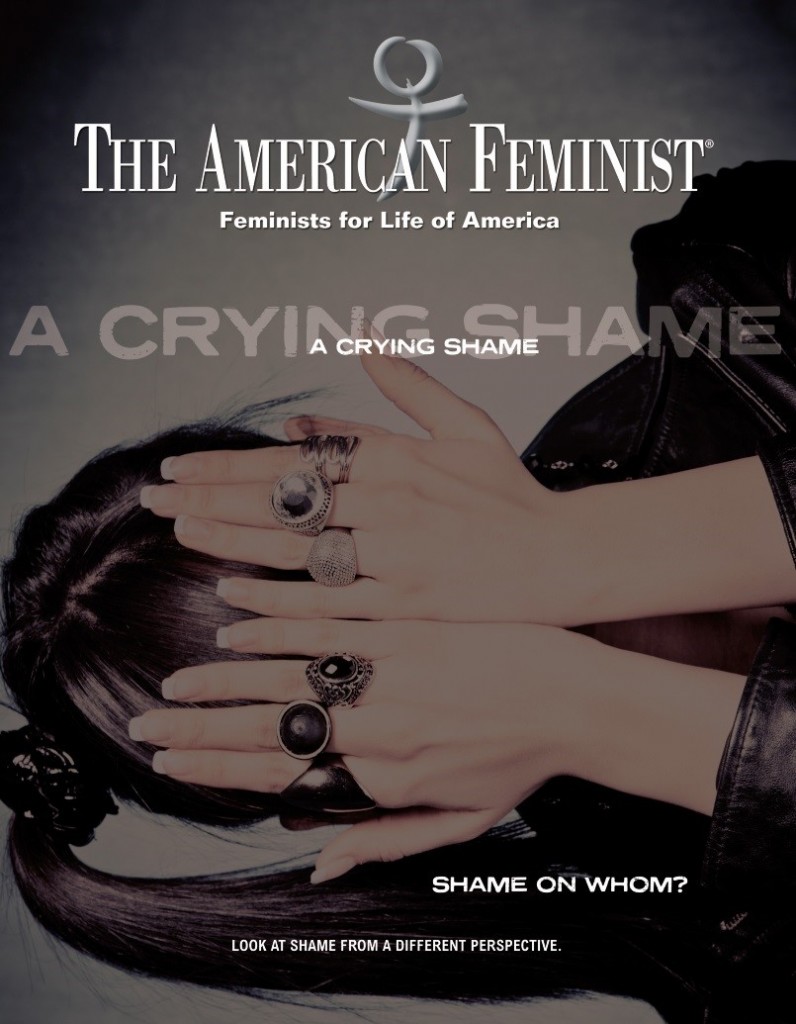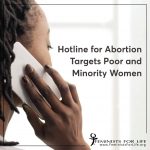“It is disgusting that someone would chose [sic] to go out of their way to create more children they cannot afford and cannot properly care for.”
“You should have to have a certain amount of income to have a baby!”
Such comments are particularly blunt examples of the hostility often directed against mothers who are poor, whether they receive assistance from family, local agencies, the federal government, religious communities, or community resource centers including pregnancy resource centers – or go without asking help of others and struggle to make it on their own. These all-too-common attitudes highlight a disturbing pair of social stigmas: on choosing life for one’s child under difficult circumstances, and on needing help in the first place.
Former FFL intern and College Outreach Program Coordinator Chaunie Brusie faced this form of shaming when she was pregnant as a senior in college. She qualified for a government program to help women, infants and children (WIC) and used food stamps, which brought her peace of mind that she would get the best for herself and her baby. Her peace of mind was turned to shame, however, when she was publicly humiliated by the cashiers and people standing in line for accidentally choosing the “wrong” brand of cereal – one not covered by WIC. In her letters to FFL President Serrin Foster, which were later
published in FFL’s magazine The American Feminist (Fall/Winter 2008), Chaunie asked “Why should one mother be treated differently than another? Does one mother deserve to be pitied, while the other celebrated, simply because of age, status, or circumstance? Is there any wonder why women are driven to abortion?” She added, “A woman should be commended, not condemned, for doing all she can to support herself and her child during school.” Today Chaunie is a registered nurse working part-time in a labor and delivery ward, author of “Two Tiny Blue Lines” about her unplanned pregnancy, and an FFL speaker. She and her husband are looking forward to welcoming their fourth baby.
Sadly, not all stories of the disparaging of poor pregnant women and mothers end on such a hopeful note. At worst, the consequences have included systematic efforts “to purify the gene pool and lessen the welfare burden of ‘defective’ individuals,” as a recent editorial in the Jesuit magazine America has summarized. In a chilling summary of the history of the eugenics movement in the United States, the editors go on to report, “Between 1907 and 1981, 63,000 Americans deemed insane, feeble-minded, criminally inclined or otherwise ‘unfit’ were sterilized at the hands of state eugenics boards. Most of the victims were poor women, and a disproportionate number were people of color.”
A subtler variation of the social pressure against childbearing for poor women argues not from their inherent “defectiveness” as such, but from the tragedy of children being born into poverty. In a February editorial in the Cleveland Plain Dealer, Andrea Levy expresses profound misgivings about “the prospect of
forcing children into a world in which we can’t guarantee food or protection – let alone love.” Setting up a harsh dichotomy between being pro-life and pro-poor (or even, ironically, pro-life and pro-child), Levy writes, “I myself do not believe that the soil of my salvation could be composted upon the suffering lives of women and children.” She concludes that she is pro-choice because she “revere[s] children,” a conclusion that is premised on the unquestioning assumption that for certain children, a life of poverty is the sole and inevitable alternative to being aborted. While Levy’s argument may at a certain level be
motivated by compassion, a response by Ohio FFL member Marilyn Kopp highlights how this line of reasoning, too, devalues the poor. Kopp responds,
“Deciding that someone’s life has no value because she might be poor or abused is not a workable standard. Do we really want to tell those children that they are better off dead? We need to address poverty by finding solutions to eradicate poverty, not to eradicate the children of poor people.”
Levy’s acceptance of injustice as an inevitability, to which abortion is the only alternative, is reminiscent of Roe v. Wade attorney Sarah Weddington’s argument, which – as FFL President Serrin Foster pointed out on the 40th anniversary of the Supreme Court decision – rightly decried the lack of
resources available to low-income women who become pregnant (including students, who are rarely financially independent), but failed to consider the possibility that this injustice could actually be changed.
Foster says, “Many women, especially poor and pregnant women, have gotten the message, ‘Shame on you. Don’t make that baby our problem. And if you can’t figure it out then get an abortion.’” According to the Guttmacher Institute, Planned Parenthood’s former research arm, 61 percent of women who have abortions are already mothers. Sixtynine percent are economically disadvantaged. “Abortion represents failure on many levels,” added Foster.
When women lack the means to provide for themselves and their children, making pregnancy the problem only masks the systemic problem of poverty. Likewise, stigmatizing the need for help only obscures life-affirming options
for women who face such need. To overcome this double bind requires both tangible support structures and broader social attitude checks, in order that no woman is pressured into the cruel choice between a life of deprivation for her
child and no life at all.
What if, instead of shaming women for parenting while poor, more focus was put on a pathway out of poverty? “Education and support by fathers are two essential ways to eliminate the feminization of poverty. Connecting poor women – including those who already have dependents – to pregnancy resource centers that can lead women through the maze of private and public resources is also imperative as we work toward ending abortion among those at highest risk,” says Foster.
Raising families out of poverty is far better than exacerbating the problem by treating the very need for help as a cause for shame.
by Julia Smucker
Read more in The American Feminist magazine here.
What else is found in Crying Shame?
- Shaming—Rather than Loving—Destroys Lives- Serrin M. Foster
- Coping With Shame, Guilt, and Fear- Margaret Leonhard, Psy.D.
- Shaming Young Mothers- Sally A. Winn
- Shaming Women Around the World- Laura Klucik
- Shaming Large Families- Susan E. Thomas
- Shaming Birthmothers- Jen Hawkins
- Shaming Sexual Assault Survivors- Joyce McCauley-Benner
- Shaming Poor Mothers- Julia Smucker
- Shaming Women Into Abortion- Kristen Walker Hatten
- Ask Serrin







